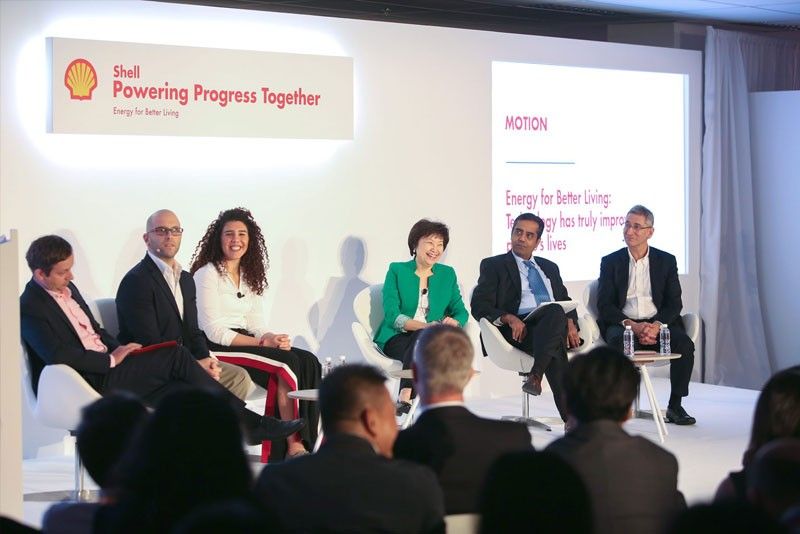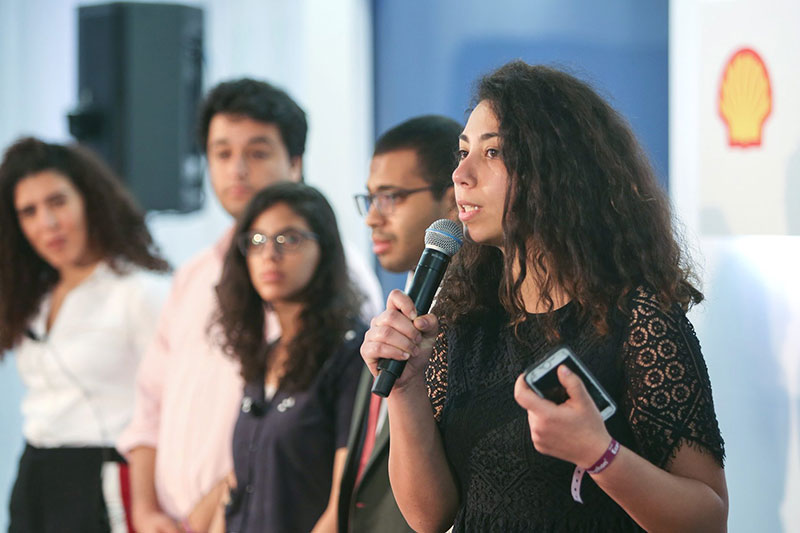Facing Asia’s traffic and energy challenges in the future

‘By 2040, a city of one million will be added every week to developing countries like India and China.’
MANILA, Philippines — It’s been two years since the Philippines hosted the Shell Powering Progress Forum and Shell Eco-marathon, but both events still have the capacity to make Pinoys think — and hopefully, take action.
The latest PPTs and marathons were held in Singapore, a close neighbor of the Philippines but one of the most progressive countries in the world — and the most expensive place to live in, a rank that has remained unchanged over the past four years, according to The Economist Intelligence Unit. From the recent event, over 150 participants from all over the world convened in the Changi Exhibition Center to mull over this year’s PPT theme, “Energy for Better Living.”
The disparity of the two countries’ economic and energy-policy standings doesn’t mean the topic was any less relevant, however. If anything, it made it even more significant, as experts from Shell put it: “Society faces a dual challenge: how to manage greenhouse gas emissions while extending the economic and social benefits of energy to everyone on the planet. In Asia, where economic progress and rapid urbanization are leading to increased energy demand, the challenge is particularly acute.”
Mallika Ishwaran, Shell’s senior economist and energy policy adviser, informed the audience that 66 percent of energy worldwide is consumed by cities. By the middle of this century, that number will rise to 80 percent. “A city of one million will be added every week by 2040,” she said. “A lot of this will be in the developing countries, the Indias and Chinas of the world.” She notes that these places that will experience mass urbanization are also places where sustainable development is needed. “Cities are a microcosm of the global change to happen. This requires collaborations and cooperation. This is about governments leveling the playing field for different types of energy sources and users in a way that respects the environment.” This impending boom also provides businesses chances to “innovate and provide solutions that allow the standards of living and energy consumption to grow while respecting the environment.”
The challenge, therefore, she says, includes how to produce more energy to meet that demand, and how to use the kinds of energy that powers buildings, manufacturing, and transport. “Each have different energy solutions —renewables, nuclear, carbon,” she adds. The challenges also lie in the quality of the energy supplied.
In this vein, one of the most interesting features of this year’s PPT was Shell’s “Imagine the Future” competition. Three country-student teams made the cut: Singapore’s Yale-NUS College in Singapore; Egypt’s American University of Cairo; and Thailand’s Chiangmai University. The student teams presented their scenarios of how people in Asia-Pacific and Middle East cities will live, work and play in 2050. Singapore’s Yale-NUS was the regional winner.
“It is very interesting to see how young minds envision the future and how they can play a part in addressing its energy challenges,” Ishwaran said.
The Philippine press delegation chose to listen in on Chiangmai’s presentation, owing to the fact that Thailand’s current state of affairs regarding environment and infrastructure is closest to the Philippines. The team from Chiangmai University indeed presented low-level solutions familiar to Filipinos: for Chiangmai, the students “foresaw” rectangular urban planning living spaces with vertical gardens to ease congestion and carbon emissions; use of solar panels; and use of electric-powered vehicles, among others. For Bangkok, they proposed roads that can power electricity (the aborted North Luzon East Expressway, proposed by Ausphil Tollways Corporation in the early 2010s, that was to shorten travel time from Quezon City to Nueva Ecija by a third, collect up to a week’s water supply for Metro Manila, and generate up to 120 MW of electricity, came to mind). The students also predicted a shift in education —shortened school hours and more time for play, they proposed, would be beneficial to ease to Bangkok’s traffic problem and create better learning opportunities for children.
Thailand’s challenges — much like our own — include government support regarding policies in infrastructure, environment, tourism, energy, and education, and an overall push in group rethink.
Philippines: A need for connectivity and better energy choices
To add Philippine context to this topic, it would be wise to consider insights from locally based sources.
One authority on urban planning, who declined to be named, opines on the general urban landscape: “I’m an optimist on how Metro Manila will look by 2050, though it’s hard to be one right now. On one hand I see more and more appreciation for compact living. The state of Metro Manila traffic is making people want communities designed to have everything within reach. Unfortunately, unless the public transport sector and accessibility of affordable housing affordable housing don’t radically change in the next 10 years, 2050 Metro Manila could just be an agglomeration of isolated islands of mixed-use communities served by P2P transport.”
The traffic and congestion that afflicts Metro Manila weighs heavily on the average Filipino, and affects “investability, connectivity and resiliency” — three aspects of development that this government is keen on providing solutions for. AECOM VP Sylvester Wong says in an interview for BCDA’s New Clark City magazine, “Infrastructure is what’s really needed.” AECOM — a global conglomerate that specializes in urban design, strategic and sustainable master planning, and competitiveness — has studied Metro Manila’s growth over the past 40 years and attests to this. This administration’s current campaign of a “golden age of infrastructure” is in line with this need.

This year’s theme, “Energy for Better Living,” was discussed by over 150 participants. (Shown: Future American University in Cairo Team.)
The article continues: 80 percent of the whole country’s services flow from Metro Manila. Studies report that P3 billion is lost daily because of Metro Manila traffic. “Congestion brings food security issues, wellness issues, energy crises. Add this to how new economies are changing commute patterns and the way people occupy space, and inevitably, the costs and risks of living and doing business in this part of the Philippines increase to almost unbearable levels.”
Infrastructure creates connectivity, and that’s what will connect the super corridor from Central Luzon and Calabarzon in the south to past Subic and Clark in the north. This area corridor has produced a significant part of economic activity from agriculture, trade, property, tourism, IT products, and manufacturing for the past 10 years.
New Clark City — a mammoth development initiative started in the last administration and being continued by this one — can be seen as part of the solution to alleviate the problems in Metro Manila. More than location, the realization of New Clark City, and locations modeled after it, represent connectivity — not just in terms of tollways and logistics, but in data and to resources. It will be the country’s first smart and disaster-resilient city, set to be completed by 2020 — a good three decades before Shell’s “Imagine the Future” scenario of 2050.
Anna Marie Gonzales, head of Sustainability at Ayala Land, Inc. and Hubert Humphrey Fellow for Urban and Regional Planning at Rutgers University chimes in on the prediction for energy needs: “I think the current painful experience of living in Metro Manila will hopefully push its citizens to be more mindful of resources. Today’s twenty-somethings, who will be running the country in 2050, have a better grasp of ecology and the limits of the planet than their grandparents. At some point in the near future, renewable energy will cease to be a good to have and become a must-have. It may even become the only option 10 to 20 years from now. The way we consume energy would then change — for our own good. I think pre-paid electricity should become an option in order to moderate demand.”
Questions and possibilities
In a recap of the predictions and ensuing conversations held by the three student groups in the event, business consultant Dawn Yip summarized: “What came out as irrelevant in the next 30 years are: cars; organized schooling; anything that is retailed in brick and mortar; and jobs that are replaceable by algorithms. What will thrive are jobs that rely on AI, VI, and VR; work that relies on extreme customization or human care; the sharing economy; barter economy; and mining outer space for minerals or products.”
The uncertainties, she noted, were all rooted in business models. “On one hand, large, centralized business models, and other hand, you have the desire for diverse and decentralized business models.” The ambiguous points lie in “tech that is constrained over concerns of privacy and restriction of choice, and on the other hand, greater acceptance of tech, as people are prepared to sacrifice of some degree of privacy because of the flexibility and choices we have.
“Next, on what role governments will play in the future of business: government telling you what business needs to happen, and on the other hand, a more enabling form of government, or taking the role of a facilitator.
“Next: Will there even be energy available? Will there be a scarcity of energy, or more accessibility of energy?”
Students, business leaders, entrepreneurs, government officials — even regular citizens not in that room that day — would do well to mull over these questions, as well. As one participant in the Shell PPT said, “Remember, these predictions aren’t prophecies, but possibilities.”
Indeed, all possibilities for a better future.



















